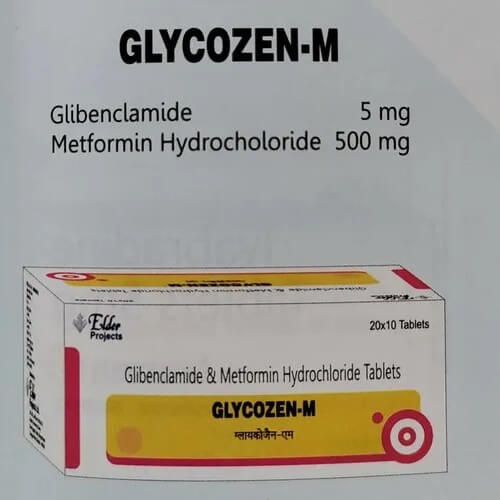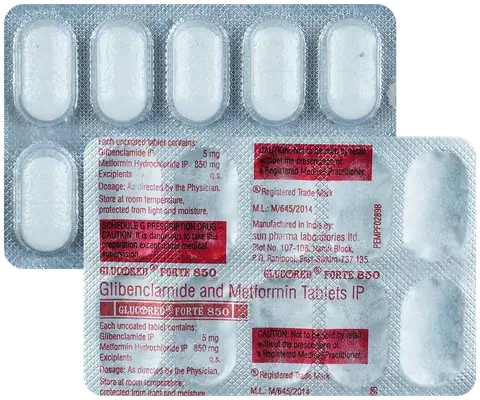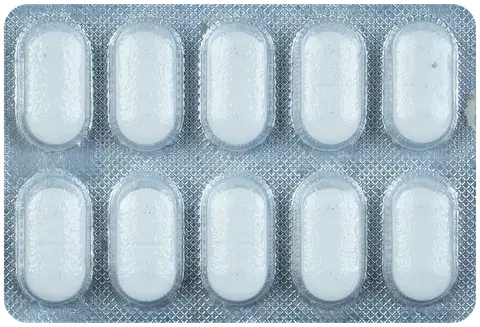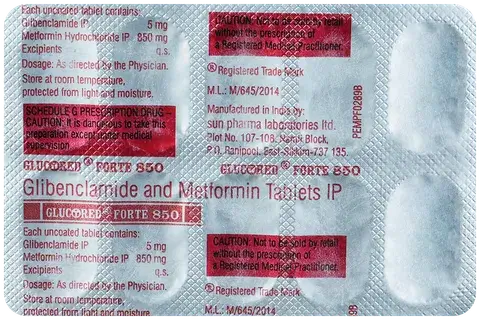Glucovance (Glyburide{Glibenclamide} + Metformin) Tablet
Generic
Glyburide{Glibenclamide} + Metformin (Generic Equivalent to Glucovance)
Glyburide{Glibenclamide} + Metformin (Generic Equivalent to Glucovance)
Glyburide{Glibenclamide} + Metformin (Generic Equivalent to Glucovance)
Glyburide{Glibenclamide} + Metformin (Generic Equivalent to Glucovance)
Glyburide{Glibenclamide} + Metformin (Generic Equivalent to Glucovance)
Glyburide{Glibenclamide} + Metformin (Generic Equivalent to Glucovance)
Glyburide{Glibenclamide} + Metformin (Generic Equivalent to Glucovance)
Glyburide{Glibenclamide} + Metformin (Generic Equivalent to Glucovance)
Glucovance Tablet belongs to a category of medicines known as anti-diabetic drugs. It is a combination of two medicines used to treat type 2 diabetes mellitus in adults. It helps control blood sugar levels in people with diabetes.
Glucovance Tablet should be taken with food. Take it regularly at the same time each day to get the most benefit. Your doctor will decide what dose is best for you and this may change from time to time according to how it is working according to your blood sugar levels.
Keep taking this medicine, even if you feel well or your blood sugar levels are controlled. If you stop it without consulting your doctor, your blood sugar levels could rise and put you at risk of kidney damage, blindness, nerve problems and loss of limbs. Remember that it is only part of a treatment program that should also include a healthy diet, regular exercise, and weight reduction as advised by your doctor. Your lifestyle plays a big part in controlling diabetes.
The most common side effect of Glucovance Tablet is low blood glucose levels (hypoglycemia). Make sure you recognize the signs of having low blood glucose levels, such as sweating, dizziness, headache, and shaking and know how to deal with it. To prevent this, it’s important to have regular meals and always carry a fast-acting source of glucose such as sugary food or fruit juice with you. Drinking alcohol can also increase your risk of low blood sugar levels and should be avoided. Other side effects that may be seen on taking this medicine include taste changes, nausea, diarrhea, stomach pain, headache, and upper respiratory tract infection. Some people may find that they put on weight with this medicine.
You should not take it if you have type 1 diabetes mellitus, if you have diabetic ketoacidosis (high levels of acid in your blood), or if you have severe kidney or liver disease. Before taking this medicine, tell your doctor if you have ever had heart disease. It may not be suitable. Pregnant or breastfeeding women should also consult their doctor before taking it. Your blood sugar levels should be checked regularly and your doctor may also advise blood tests to monitor your blood cell counts and liver function.
Uses Of Glucovance Tablet
- Treatment of Type 2 diabetes mellitus
Benefits Of Glucovance Tablet
In Treatment of Type 2 diabetes mellitus
Glucovance Tablet is a medicine that helps to control high blood glucose (sugar) levels. It helps get rid of extra glucose from your body through urine. It also improves the body’s response to the hormone insulin, which is responsible for regulating blood glucose (sugar) levels in our body. The insulin helps to lower your blood glucose levels and prevents them from rising after taking meals. You should keep taking it for as long as it is prescribed.
Lowering blood glucose levels is an essential part of managing diabetes. If you can control the level you will reduce the risk of getting any of the serious complications of diabetes such as kidney damage, eye damage, nerve problems, and loss of limbs. Taking this medicine regularly along with proper diet and exercise will help you live a normal, healthy life.
Side Effects Of Glucovance Tablet
Most side effects do not require any medical attention and disappear as your body adjusts to the medicine. Consult your doctor if they persist or if you’re worried about them
Common side effects of Glucovance
- Hypoglycemia (low blood glucose level)
- Taste change
- Nausea
- Diarrhea
- Stomach pain
- Headache
- Upper respiratory tract infection
How To Use Glucovance Tablet
Take this medicine in the dose and duration as advised by your doctor. Swallow it as a whole. Do not chew, crush or break it. Glucovance Tablet is to be taken with food.
How Glucovance Tablet Works
Glucovance Tablet is a combination of two antidiabetic medicines: Glibenclamide and Metformin. Glibenclamide is a sulfonylurea which works by increasing the amount of insulin released by the pancreas in order to lower the blood glucose. Metformin is a biguanide which works by lowering glucose production in the liver, delaying glucose absorption from intestines and increasing the body’s sensitivity to insulin.
Disclaimer :The information provided on the website is intended to facilitate awareness about healthcare products and medical conditions generally but it is not a substitute for professional medical attention or advice. You should always speak with a qualified healthcare practitioner before taking any prescription or non-prescription drug. |
| Product Type--Salt | Generic–Glyburide{Glibenclamide} + Metformin (Generic Equivalent to Glucovance) |
|---|---|
| tag--Manufacturer | Best Selling–Orchid Chemicals & Pharmaceuticals, Top Brand–Strides Shasun, Best Selling–Cipla, Top Brand–Symet Drugs, Best Selling–Sai Mirra Innopharm, Top Brand–Elder Pharmaceuticals, Top Brand–Bharti Life Sciences, Top Brand–Sun Pharmaceutical |
| Power--Pack Size | 1.25mg + 250mg–60 Tablets, 1.25mg + 250mg–120 Tablets, 1.25mg + 250mg–180 Tablets, 1.25mg + 250mg–270 Tablets, 1.25mg + 250mg–60 Tablets, 1.25mg + 250mg–120 Tablets, 1.25mg + 250mg–180 Tablets, 1.25mg + 250mg–270 Tablets, 2.5mg + 400mg–60 Tablets, 2.5mg + 400mg–120 Tablets, 2.5mg + 400mg–180 Tablets, 2.5mg + 400mg–270 Tablets, 2.5mg + 400mg–60 Tablets, 2.5mg + 400mg–120 Tablets, 2.5mg + 400mg–180 Tablets, 2.5mg + 400mg–270 Tablets, 5mg + 500mg–60 Tablets, 5mg + 500mg–120 Tablets, 5mg + 500mg–180 Tablets, 5mg + 500mg–270 Tablets, 5mg + 500mg–60 Tablets, 5mg + 500mg–120 Tablets, 5mg + 500mg–180 Tablets, 5mg + 500mg–270 Tablets, 5mg + 800mg–60 Tablets, 5mg + 800mg–120 Tablets, 5mg + 800mg–180 Tablets, 5mg + 800mg–270 Tablets, 5mg + 850mg–120 Tablets, 5mg + 850mg–60 Tablets, 5mg + 850mg–180 Tablets, 5mg + 850mg–270 Tablets |




